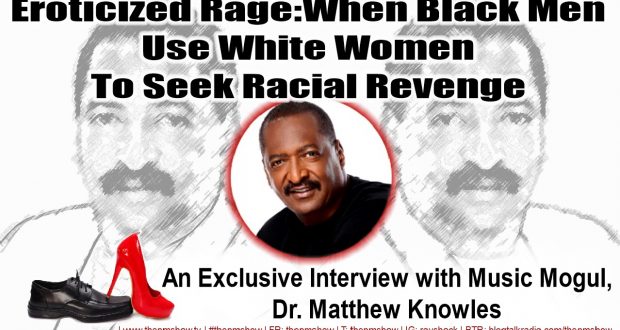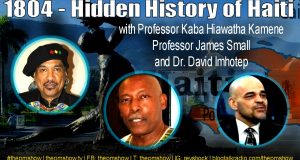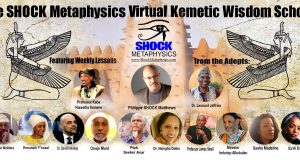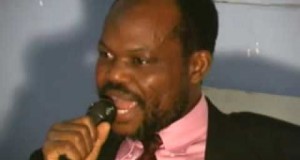
In an interview entitled Eroticized Rage: When Black Men Use White Women To Seek Racial Revenge, Philippe SHOCK Matthews spoke in depth with Matthew Knowles about the topic. Knowles is founder of Music World Entertainment (MWE), father of world-renowned singer Beyonce, and author of the book Racism From the Eyes of a Child.
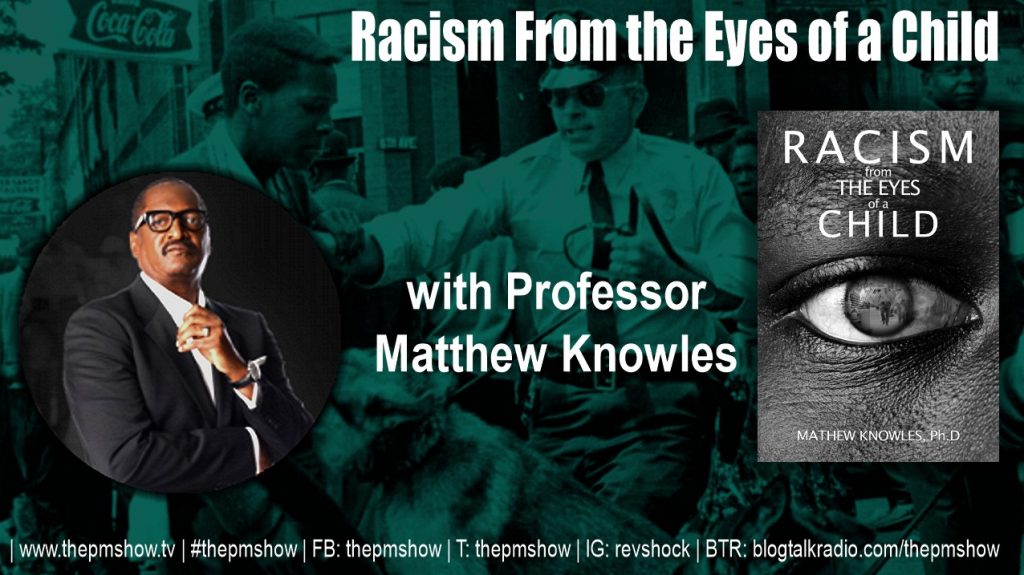 Celebrity status aside, Knowles is a 1974 graduate of Fisk University, where he earned both a Bachelor of Arts degree in Economics and a Bachelor of Science degree in Business Administration. During his alma mater’s University’s 2008 Commencement Ceremony, he was bestowed with the honor of Doctor of Humane Letters.
Celebrity status aside, Knowles is a 1974 graduate of Fisk University, where he earned both a Bachelor of Arts degree in Economics and a Bachelor of Science degree in Business Administration. During his alma mater’s University’s 2008 Commencement Ceremony, he was bestowed with the honor of Doctor of Humane Letters.
He is also one of the greatest examples of someone who has experienced erotic rage or eroticized rage which he described in his blog as a form of revenge that black men do to combat the racial battle fatigue, macro/microaggressions imposed on them.
“Such unconscious conditioning affects any number of men who go after race as the primary basis for their romantic choices. For them, in frustration of what they are socially denied, it is an act of vengeance getting what is considered taboo.”
In an article in Beyond Black & White, he blamed his mother for his colorism that has a link to racism and erotic rage.
“When I was growing up, my mother used to say, “Don’t ever bring no nappy-head Black girl to my house,” he said. In fact, he said he married Beyonce’s mother and his now ex-wife Tina because he thought she was white. He also admitted that he sought and dated light or white-colored women as a way to get back for the rage he felt during the during the Civil Rights era.
Dating in this context, however, is aimed to defile rather than value a woman.
What is eroticized range from a rage-based perspective?
As already mentioned, erotic rage is doing something out of revenge. But Dr. Patrick Carnes describes it as “about breaking rules and the abuse of power.” The statement is further backed by Knowles during his interview with the Los Angeles Sentinel where he defines it as “when Black men date White woman due to built-up rage. He feels as though that he has to date White women to regain his power.”
Due to Knowles’ obsessiveness about feeling unequal to his white counterparts, he needed therapy. This only showed how Race-Based Eroticized Rage has a negative effect on black men.
Hurt People Hurt People
Judging from the way Knowles dealt with his issue on colorism and being denied of dating women of light or white color, it is easy to see that being a victim made him intent on consciously or unconsciously harming his life and those closest to him. Eroticizing white women as a means to take back control made him feel good at some point but he was really emotionally hurting himself in the process.
But not every black man who dates white or light-skinned women are out to date with a racial vengeance. As what Knowles said in his interview with Philippe SHOCK Matthews:
“Is that trauma what some white immigrant’s descendants subconsciously inherited and passed on to their children? Evidence being found in their mean actions against the Native American, African, and Caribbean people they enslaved? Was it a case of hurt people hurt people, or just plain evil?”
Effects of Race-Based Traumatic Stress and Injury (RBTSI)
According to Dr. Nzingha Dalila, RBTSI refers to an emotional injury that is motivated by hate or fear as a result of race. The hate or fear can be due to one person or a group of people.
It is also a racially motivated stressor that disables the capacity to cope or, in a severe and interpersonal case, results in bodily harm or threat of life integrity. Also, it can be motivated by racism that leads to fear, horror, and helplessness.
RBTSI can occur as racial discrimination, racial harassment, and racial violence. Because a person subjected to such an injury goes through a traumatic experience they manifest a traumatic reaction. Any event that they perceive as ambiguous, negative, repeated stress response, sudden or unexpected, and uncontrollable, they will consider traumatic. This can lead to a number of psychological, physiological, and social outcomes.
A person with RBTSI will show symptoms of increased arousal or vigilance, avoidance of any trauma-associated stimuli, and intrusion or re-experiencing.
Knowles suffered trauma as a child and as an adult. He experienced being laughed at for making a mistake in Mr. Jones 8th grade English class, to being tripped, shoved, and have stuff thrown at him. Black kids who go to white school are labeled as an Oreo.
Nothing much changed when Knowles became an adult and a music mogul. He witnessed firsthand racism in the music industry, both overtly and covertly. In fact, pop music means white and urban music means black.
Dealing with RBTSI
Knowles underwent therapy to treat his obsessiveness and impulsive behavior, where he was diagnosed with doing everything to the extreme. At that time, he was already enjoying success and used sex and alcohol to cope. Although overdoing things made him successful, it had its share of problems as well.
The same therapy helped him liberate himself from colorism. It made him realize that “The harshest form of racism was making us hate ourselves and internalize the slave owner’s dislike of our looks and skin tones.”
What’s White Love Got to Do with It
Knowles admitted that he was guilty of eroticized rage and subconsciously saw white female as a way to get even or get back. Many black men are not even aware of this happening or them acting on it.
It was through therapy where he had a breakthrough and realized that he dated mainly white or black women that looked white because of their very high-complexion. It was only later when he found out that his former wife was not white and that she was very much in tune with her being black.
Today, Knowles takes pride in his new wife’s admiration of her lovely brown skin and her intelligence and grace. His therapy sessions liberated him from colorism.
- RELATED:
- Racism From the Eyes of a Child with Professor #MatthewKnowles
- Matthew Knowles Introduces Blushhh Music
- Mathew Knowles on Beyonce and the DNA of Achievers

 Philippe Matthews Show Guru Advice, Author Reviews, Tech Reviews, Entertainment News
Philippe Matthews Show Guru Advice, Author Reviews, Tech Reviews, Entertainment News


